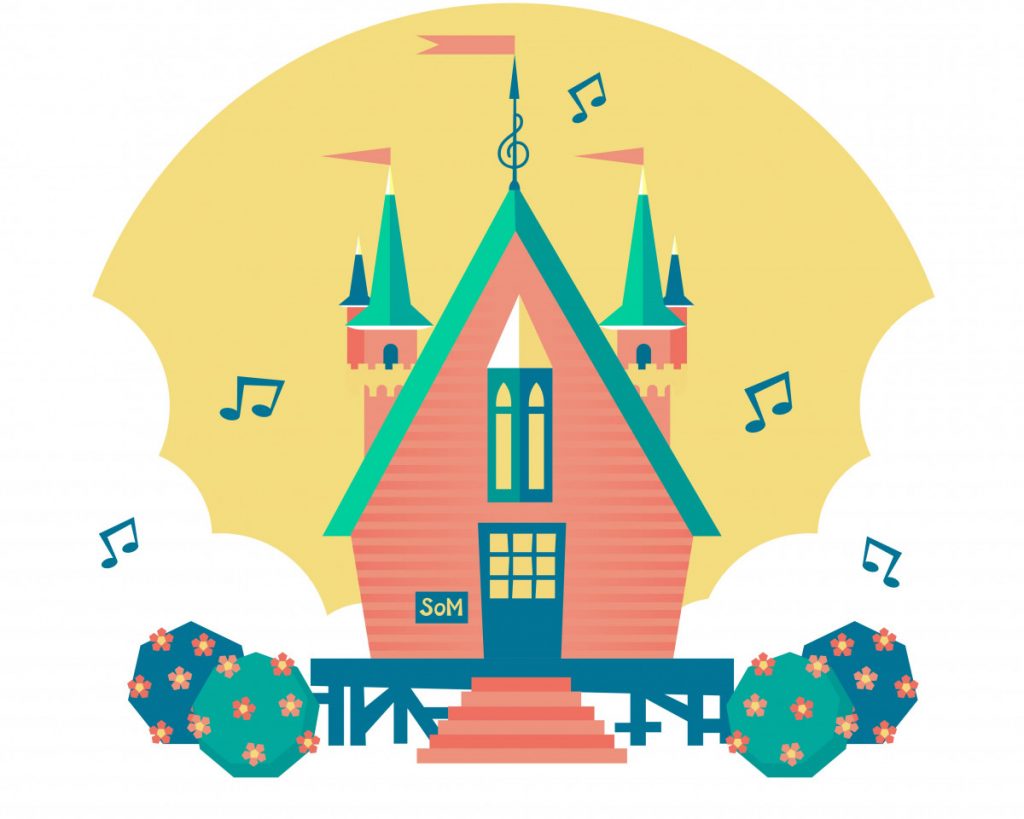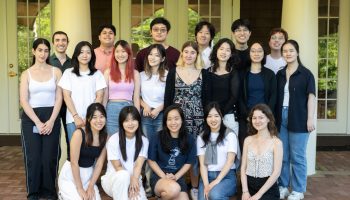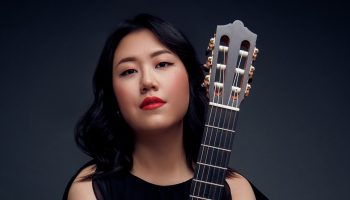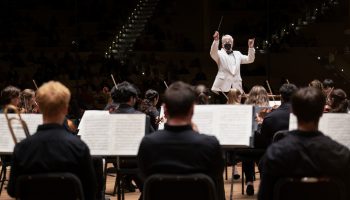
John Milbauer, co-chair of Chautauqua’s School of Music Piano Program, watched Christopher Taylor’s afternoon piano recital from his 13-inch MacBook Pro, listening to his “awe-inspiring” Scriabin Impromptu through a pair of wireless headphones. And he had goosebumps.
By “most objective metrics,” he said, that never should have happened.
In that moment, Milbauer should have been watching from the back of Elizabeth S. Lenna Hall. When it was over, he should have been able to walk up to Taylor, thanking him for his time, contribution, and the way he inspired Milbauer’s piano students, who would have filled a majority of the room.
Instead, he engaged from his home in Arizona, more than 1,000 miles from the Institution, the tingling of the skin on his arms one of the only physical reminders of his “home away from home.” Was this situation ideal? No, Milbauer said. Was it worth doing? Well, compare it to the alternative.
“The alternative to an online program is having no program,” Milbauer said. “You can say, ‘This is not what I want, this is not why I am in music,’ or you can say, ‘This is a chance to interact with people, people who have a need to feel a part of something greater.’ That need can be met over distance.”
The distance was vast. Milbauer taught students in Korea, China, London and across the United States. His main concern when the School of Music’s programming started in Week Three, was finding a way to form connections across continents.
“I think the connection comes from having a philosophy about what great music making sounds like and how it’s best approached,” he said. “How do you lead a life of music, integrity, honesty, openness and imagination? With a unity of purpose.”
Suzanne Fassett Wright, director of arts education, said the school’s faculty accomplished “everything they set out to do,” but couldn’t pass out praise without mentioning the risk involved. Most major American classical institutions canceled their summer programming entirely, including the Tanglewood Music Festival in Massachusetts, the Aspen Music Festival and School in Colorado, the Ravinia Festival in Illinois, and the Glimmerglass Festival, also located in New York.
It was about people feeling empowered to express their art, it was about conversations, and then it was about the music itself,” Wright said. “I know it sounds lofty, but it’s true. (Chautauqua) is the people. That needed to come first.”
There were a million things that could have gone wrong when Chautauqua decided to press on, Wright said, and in her own words, her job was to keep it at “just one thousand.”
“I think I am most proud that we had the guts to do it and not worry about our stature, or what it would look like if we failed,” she said. “We heard what students needed and we did it.”
In the beginning of June, the School of Music faculty emailed surveys to students, asking them what they needed to get out of their virtual summer. More than lessons and coachings, Wright said students were seeking guidance and a path forward. To deliver an enriching summer, each of the four weeks were built around a different component of artistic development, such as “Innovation and the 21st Century Musician,” “Challenges and Opportunities Facing Today’s Professional,” “Career Enhancement and Development” and “Conversations with CHQ Distinguished Alumni and Faculty.”
“It was about people feeling empowered to express their art, it was about conversations, and then it was about the music itself,” Wright said. “I know it sounds lofty, but it’s true. (Chautauqua) is the people. That needed to come first.”
Through master classes, audition seminars and recitals, the music lived on, too. Timothy Muffitt, music director of the Music School Festival Orchestra, oversaw the Instrumental Program’s recitals and said they served as a “focal point” for building relationships.
“The recitals were our chance to get to know (the students),” Muffitt said. “It was their chance to bring something personal to the table.”
Across the Piano, Instrumental and Voice programs, the weekly recitals were open, meaning students could choose what they wanted to perform. Milbauer, who hosted the piano recitals with co-chair Nikki Melville, said it was a freedom they earned.
“Some students have beautiful pianos in their homes, some don’t,” Milbauer said. “Some have access to their schools, others do not. Given all of the other constraints, let’s not constrain them with repertoire. We wanted them to show us what they do best — that was the only request.”
The weekly recitals, however, didn’t compare to the amount of performances students take on in a “normal summer,” Muffitt said. For the first time, faculty and students had the opportunity to have more “in-depth conversations” about music, filling the “absence of its playing.”
Wright agreed, and said musicians exist on a “constant treadmill” of running from a practice room, to a rehearsal to a performance. The discussions have given Wright an opportunity to assess the “lack of space” in previous summers.
Things went decidedly right because there was so much thought given to the ‘what-ifs’ of the world — that’s how we built this thing on a solid foundation,” Muffitt said.
“It has given us space to ask ourselves what we are doing and why we are doing it, and I think there is great value in that,” Wright said. “When you keep charging forward without a lot of introspection, that’s a scary thing to do, to look at yourself in the mirror and question your own goals and intentions.”
Wright, Milbauer and Muffitt each experienced their fair share of technical difficulties, frustrations and “what-might-have-beens.” To be frank, Muffitt said the bar was set “fairly low.”
“It was unchartered territory and we had no idea what to expect, even on basic things,” he said. “Would the infrastructure work? Could we make a working human connection over the internet? Even harder, could we do it through music?”
To everyone’s credit, Muffitt said the mishaps and mistakes were embraced, and “never dwelled on.”
“Things went decidedly right because there was so much thought given to the ‘what-ifs’ of the world — that’s how we built this thing on a solid foundation,” Muffitt said.
Even though musicians were able to make music virtually, the importance of in-person instruction cannot be understated.
“I learned how valuable that connection is, getting feedback about if they are getting what you hope they are getting,” Muffitt said. “In (a virtual) format, there wasn’t an opportunity for that. Sometimes I think we just wanted to step off of the topic of the day.”
The culmination of the faculty’s efforts is evident in the perspective of students. Melanie Long, a voice student from the Manhattan School of Music, said when she looks back at the summer of 2020, it will be known as “the summer that saved her.”
“With everything going on in the world, music is my safe haven, my passion; it’s just who I am,” Long said. “I think that is really what saved my soul, seeing how important music is to people in general. Music is the world’s universal language of therapy and the world’s universal language of love and compassion. It’s on the other side of everything we make it through.”
All current students have been invited back for the 2021 season. While there are uncertainties about whether it will take place in-person or online, Wright said one thing is indisputable: From this day forward, the School of Music programming will prepare for future seasons the same way it did for this year’s — by listening.
“That means providing more space for reflection in the years to come, because I think what students will remember most about this summer is the effort people put into connecting with them,” Wright said. “They know we didn’t have to do that — we wanted to do that.”




